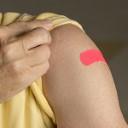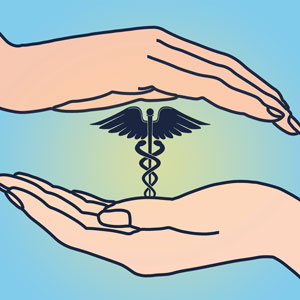-
Avoiding Unnecessary Lymph Node Biopsy
A study adds to evidence that many patients with ductal carcinoma in situ do not need to have their lymph nodes removed.
by Cheryl Platzman Weinstock
-
Encouraging Beneficial Gut Microbes
Nutritional epidemiologist Carrie Daniel-MacDougall discusses research suggesting that what patients eat affects their gut microbes—and could influence cancer immunotherapy response.
by Anna Azvolinsky
-
Cancer Takes an Unequal Toll on Employment
In a study of women with breast cancer in North Carolina, those who lived in rural areas or were black were more likely than urban white women to report negative changes in their employment.
by Pamela Rafalow Grossman
-
Cancer and Credit
The financial burden of a cancer diagnosis can lower a patient's credit score.
by Shelly Rosenfeld
-
Treating Fear of Recurrence
Cognitive behavioral therapy may help cancer survivors cope with fear of recurrence, some studies say.
by Jon Kelvey
-
Learning the Language of Chemotherapy
Cancer patients often do not understand words their doctors use while talking about chemotherapy, but a new video series helps explain these terms.
by Jen Tota McGivney
-
Navigating Hospital Discharge Decisions
Patients with advanced cancer often go to rehabilitation facilities after a hospital stay in hopes of gaining the strength for further treatment, but the majority do not go on to receive additional cancer therapy, a study reports.
by Ashley P. Taylor
-
Cancer Patients Should Receive Flu Shots
People with cancer are at increased risk of serious complications if they get the flu. Flu shots are safe for this group, and a recent study bolsters evidence of their effectiveness.
by Carly Weeks
-
September 27: The Week in Cancer News
A study examines how poor and minority patients are more likely to be diagnosed with cancer in the emergency room, and a cancer survivor considers the lasting effects of chemotherapy.
by Bradley Jones
-
Integrative Oncology
Some patients are benefiting from using nontraditional therapies alongside conventional treatments like surgery, chemotherapy and radiation.
by Stephen Ornes
Cancer Talk
Physical Activity Linked to Lower Colon Cancer Recurrence
Participating in a structured exercise program after treatment was associated with a reduced risk of recurrence in people who had colon cancer.
by Sandra Gordon
Gaps in Survivorship Care Leave Unmet Needs After Cancer TreatmentA survey of head and neck cancer survivors reveals that many are not getting adequate survivorship care and may not even know it is available.
by Cameron Walker
Improving Communication for Deaf Cancer PatientsAfter a cancer diagnosis, people who are deaf or have hearing problems can struggle if accommodations don’t meet their communication needs.
by Eric Fitzsimmons
Is Immunotherapy Right for People Hospitalized With Advanced Cancer?Researchers find no evidence that immune checkpoint inhibitors benefit cancer patients getting inpatient care. They urge earlier consideration of palliative care.
by Kyle Bagenstose















